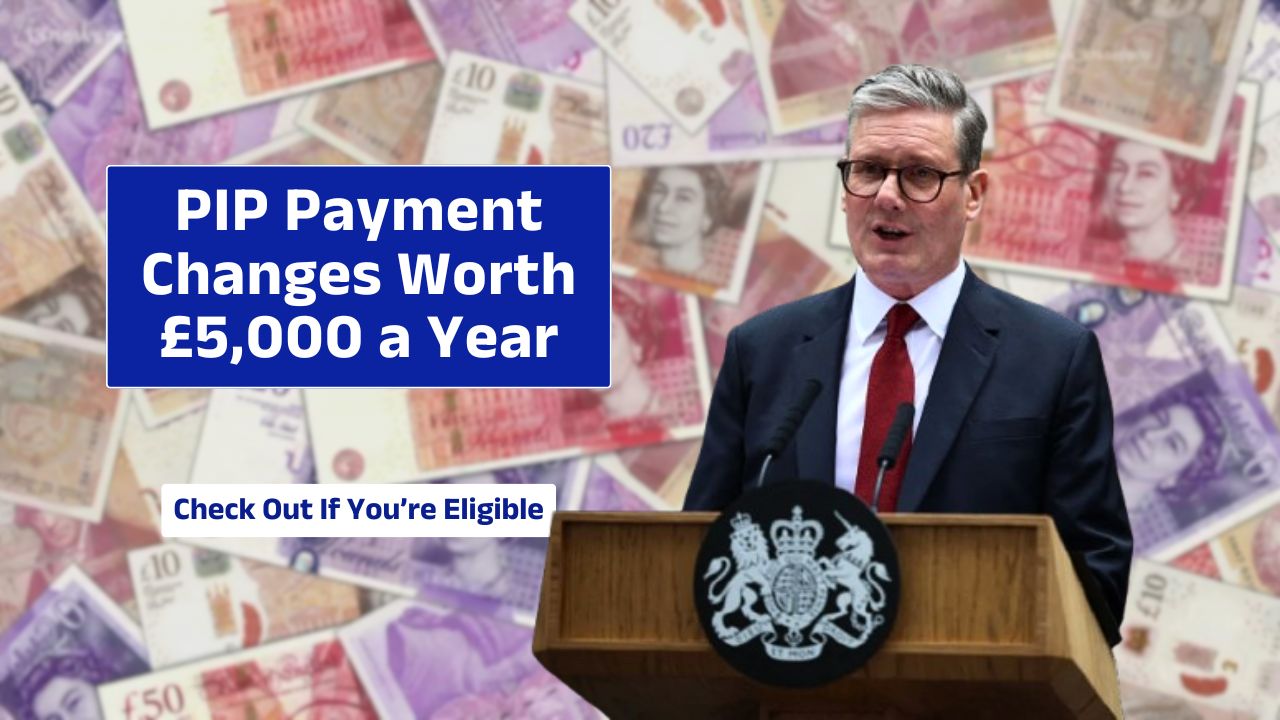If you’re receiving Personal Independence Payment (PIP), or thinking about applying, you may have heard that recent changes to the system could result in a back payment of up to £5,000. Sounds like a windfall—but who actually qualifies? What caused the change? And how can you make sure you’re not missing out?
Let’s break it all down in plain English so you can understand whether you’re eligible, how to claim, and what steps to take next.
Overview
Here’s a quick snapshot of what you need to know:
| Key Detail | Information |
|---|---|
| Back Payment Amount | Up to £5,000+ |
| Affected Claimants | People needing help with face-to-face interactions |
| Rule Change | Social support now better recognised in PIP assessments |
| Backdate Eligibility | From the time you met the new criteria |
| Review Process | DWP reviewing claims that could be affected |
| Official Source | Department for Work and Pensions (DWP) |
What Changed
In 2024, a change was made to how the DWP assesses social support needs during PIP claims. Previously, many people who required help in social situations—such as attending appointments, dealing with public transport, or managing daily conversations—were overlooked or placed in lower payment bands.
Now, if your condition affects your ability to engage face-to-face and you rely on someone else, even informally, to help with this, you may qualify for a higher PIP rate. In some cases, it’s led to backdated payments of thousands of pounds.
How PIP Works
PIP is a non-means-tested benefit for individuals with a disability or health condition that impacts their daily life or mobility. It has two components:
- Daily Living – for help with everyday tasks
- Mobility – for help with getting around
Each is paid at a standard or enhanced rate, depending on the severity of your needs.
During the assessment, a DWP-approved assessor will look at how your condition affects your daily life. Previously, social anxiety, mental health conditions, and cognitive impairments didn’t always result in higher daily living awards unless formal support was in place. That’s changed now.
Real Example
Take Mary, for instance. She’s 52 and has severe anxiety and depression. For two years she only got the standard PIP rate. But she regularly needed her daughter’s help to attend appointments and shop for essentials.
Under the new interpretation, this counts as needing support for face-to-face interaction. After submitting evidence, Mary was awarded the enhanced daily living rate and got a £2,000 back payment. Her weekly payment also increased by £33.65.
Are You Eligible?
You could qualify for a back payment if:
- You currently receive PIP but weren’t assessed fairly for social support
- You were denied the enhanced rate but regularly need help with social interaction
- Your claim dates back to when the rules changed or earlier
- You or your carer can show evidence of needing assistance in daily social settings
You don’t need to have a formal carer—informal support from family or friends can qualify too.
How To Claim
If you think you’re affected, here’s what you can do:
1. Check Your Current Award
Look at your decision letter and the points awarded for daily living. If the points seem low for social support needs, you might have a case.
2. Contact the DWP
Call the PIP enquiry line and ask them to review your claim in light of the 2024 rule change.
3. Submit New Evidence
Provide examples: who helps you, how often, and why. Include GP letters, therapist notes, or even statements from people who support you.
4. Request a Review
If you’re unhappy with your award or were denied PIP, ask for a Mandatory Reconsideration.
Avoid Common Mistakes
Don’t let avoidable errors block your payment. Here are the top mistakes to watch out for:
- Not explaining your struggles clearly – Be detailed, not modest.
- Failing to provide backup – Include doctor notes, prescriptions, care letters.
- Missing deadlines – Stick to the one-month window for appeals or reconsiderations.
- Forgetting to mention informal help – Family assistance still counts.
Extra Support
Being awarded PIP unlocks more than just monthly payments. You may also qualify for:
- Council Tax Discounts – Many local authorities offer reductions
- Free Travel Passes – Or discounts on buses, trains, and taxis
- Blue Badge Scheme – For easier parking
- Warm Home Discount – Reduced energy bills during winter
Make sure to check with your council or energy provider.
What If You Disagree
If you think your PIP assessment was wrong, there’s a clear appeal process:
- Mandatory Reconsideration – Ask the DWP to review the decision
- Gather New Evidence – Get updated medical letters or statements
- Appeal to Tribunal – If rejected again, take it to an independent tribunal
You don’t need a solicitor—many people win appeals on their own or with help from a welfare adviser.
The recent changes to how social support needs are assessed could make a huge difference for many PIP claimants. If you’ve ever needed regular help dealing with people or public settings, don’t assume you’re not eligible. Review your case, reach out, and make sure you’re not missing out on a benefit you’re entitled to.
FAQs
Can I really get a £5,000 PIP back payment?
Yes, if you now qualify for a higher rate due to the new rules.
Do I need formal care to qualify?
No, informal help from family or friends can also count.
How do I request a claim review?
Contact the DWP and ask for a review of your award.
What is a Mandatory Reconsideration?
It’s the first step in appealing a PIP decision.
What evidence should I include?
Medical letters, care notes, and personal impact statements help.













